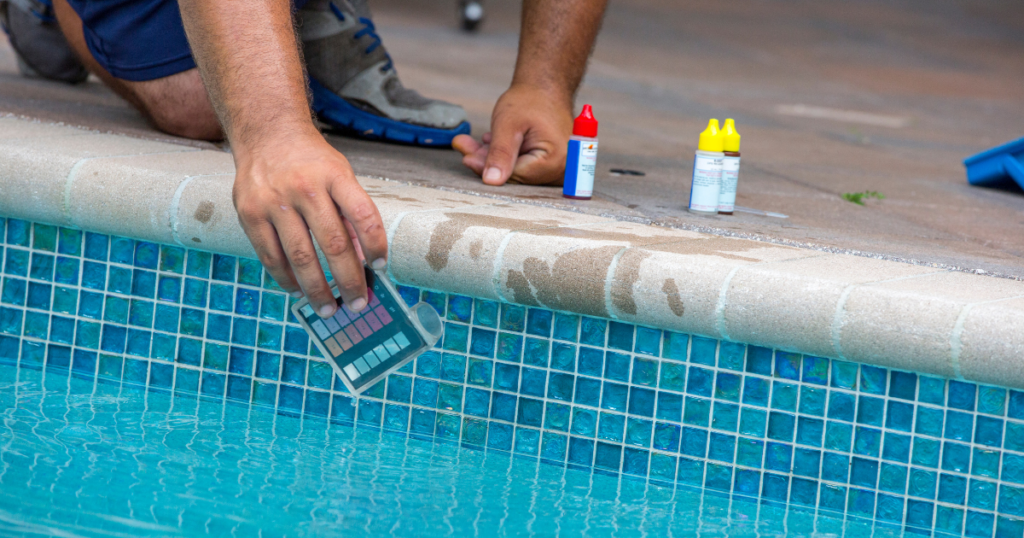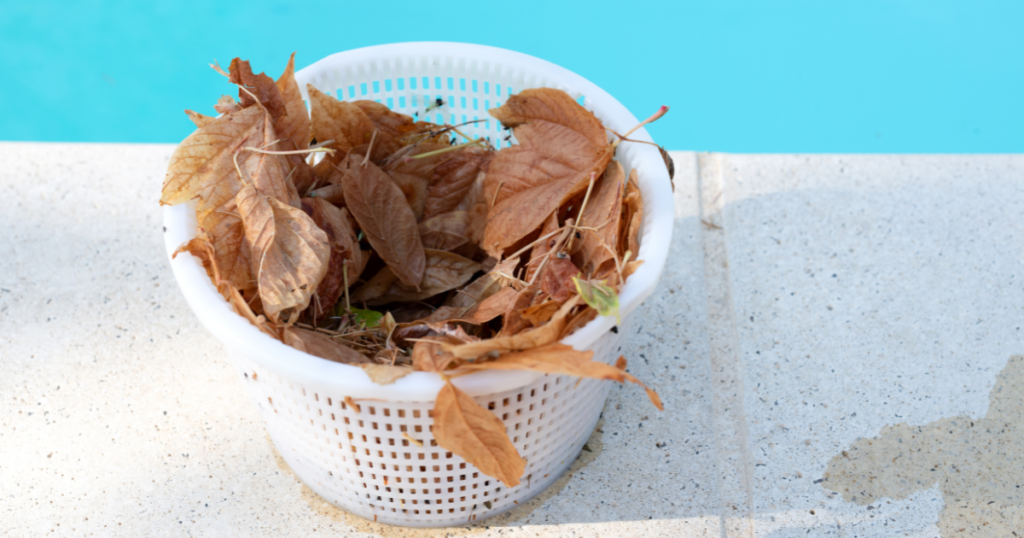According to The Pool & Hot Tub Alliance, there are approximately 10.4 million residential pools in the United States. Could one of them be yours?
They are fantastic assets to any home, and there’s nothing better than jumping in your own private pool on a hot day…But with great things come great responsibilities! For instance, are you looking after your pool as best as you can? Many pool owners struggle with cloudy water, a common problem in home pools.If you’ve noticed this happening to your pool, read on to learn the most common causes of cloudy pool water and how you can fix it.
5 Causes of Cloudy Pool Water

1. Unbalanced Pool Chemicals
If the chemicals in your swimming pool are off-balance, it can lead to cloudy water. Not only that but an excess of chemicals like chlorine can be hazardous to your health, triggering itchy eyes and skin irritation.
Chemicals such as chlorine and other sanitizers do an important job of keeping our pools clean and safe. To prevent cloudy water from these chemicals, test the alkalinity and pH of your pool regularly to make sure the balance is as it should be. If your chlorine levels are above 0.5 ppm, you may need to shock the pool to avoid murky water. Chlorine levels can often fluctuate based on environmental factors as well, including heavy rainfall or extreme sun, which can oxidize chlorine.
Always follow the correct guidelines for the volume and size of your pool. If you’re not confident handling the chemicals, you might prefer to outsource the task to a pool cleaning company, who are experts in making sure your chemical levels are correct!
2. Your Pool Filter
A cloudy pool could also be because of your pool’s filter. Pool filters are essential for maintaining clean pool water. As the water cycles through the filter, this process helps remove impurities and dirt from entering your pool.
To avoid problems with your filtration system, ensure it’s running at least 8-10 hours per day. If you frequently use your pool, then the filter should be running constantly.
Check your filter regularly for any blockage, such as leaves or branches, that might be preventing the water from being filtered. Even with the filter running, if the water can’t get in, it won’t get cleaned! If your filtration system is experiencing high pressure in the tank, this can be damaging. Pressure build-up can cause cracks which can seriously hurt your system.If your filter cartridges are old or malfunctioning, you’ll be able to tell by spotting dirty, unclean pool water. Update your pool filter cartridges at least every 3-5 years, depending on use, to keep your pool looking its best. They should also be rinsed regularly!
Warning Signs of Filter Problems
In addition to cloudy water, there are other indicators that your filter could be in trouble. You may start to notice dirt or debris coming back into the pool, water leaking from the system, or a filter running much slower than it usually does.
If you have any suspicions that your filtration system isn’t working properly, call a professional or check the filters. Don’t swim in the water again until you know it’s safe to do so.
3. The Environment
Since our pools are outdoors, they tend to collect various things like bugs, leaves, debris, grass cuttings, and pollen. Although your pool filter should prevent these from entering your pool water. If it isn’t working properly, you may have a dirty-looking pool.
In addition to making sure your filter is working, there are also a few other things you can do to help keep your pool clean. To remove leaves and surface debris, use a skimmer, typically for a long pool, to remove any unwanted materials that are floating on your pool water’s surface.
You should also consider investing in a pool vacuum. Most pool vacuums work automatically and sit on the bottom of the pool, using pressure or suction to clean everything up.
Keeping the deck of your pool clean can help prevent debris from getting blown into the pool. A leaf blower can make this an easy task! Also, look after your yard’s landscaping. Trim any branches or overgrown plants that could get into the pool water.
4. Blocked Skimmer Baskets

It’s helpful to check and empty your skimmer baskets regularly. They can quickly collect a lot of leaves or dirt, which can prevent their suction from working properly or may even clog it entirely. It’s also not uncommon for small animals, such as frogs, to get trapped inside!
Skimmer baskets are usually very easy to clean. All you do is simply lift off the lid, pull out the basket, and empty it. This should be a part of your regular pool maintenance routine.
5. Sunscreen and Sweat
If your pool is frequently swum in, you may start to notice an oily film on the surface. Often, this is caused by sunscreen, and one way to prevent this from happening is to wait until the sunscreen has completely dried on your skin before jumping into the pool. Although this can be tough on a hot day, especially for kids, it’s best to wait to avoid the sunscreen residue from getting in your water.
Sweat can create a similar problem, as can lotions and cosmetics. If you start to notice this, you may not be running your pool filter for long enough. When you start to see the consistency of the water change, or you’ve had a pool party with many people in the pool, try running your filter continuously until the water looks clear again.
Clean Your Pool Water Often
As long as you look after your pool water, your home swimming pool will provide fun, relaxation, and exercise for years to come! Set aside time each week to clean and check your pool, so you and your family can happily play in its beautiful, crystal-clear water. If you are needing to replace your pool filters, shop our wide selection of filters from all the major brands!
Other Frequently Asked Questions
Can I swim in cloudy pool water?
The only time it’s truly unsafe to swim in cloudy pool water is if the cause is due to a chemical imbalance. If you’ve not tested your pool water and are unsure of the cause of the cloudy appearance, don’t swim in it! It could also be debris that is causing the water in your pool to look dirty.
Why did my pool get cloudy overnight?
Inadequate circulation caused by blocked skimmer boxes or dirty/damaged filtration equipment that needs replacing are a couple of causes of a cloudy pool overnight. Insufficient filtration time where your pump isn’t running long enough to filter the water properly can be another.
What happens if you go swimming in a pool that was just shocked?
Due to the high chemical levels, you may experience eye and skin irritation. Shock contains high amounts of chlorine and bleach, both of which can be harmful.
How do I know if I need to shock my pool again?
Aim to shock your pool about once a week, with the additional shock after heavy use. Some signs that your pool may need to be shocked are cloudy, foamy, green, or odorous water.
